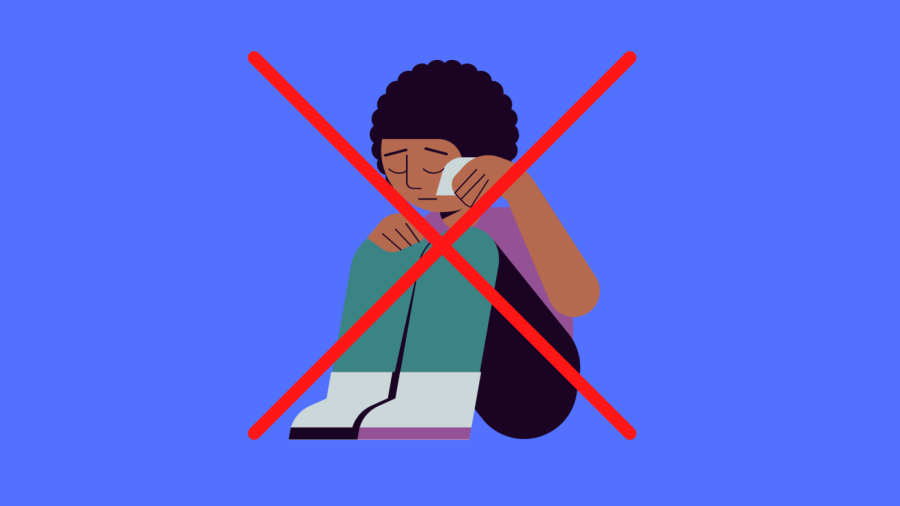Boys don’t cry
Joel Garibay (Made with Canva)
Because of toxic masculinity men aren’t allowed to express emotions.
Gender roles between men and women have always burdened the emotions and freedom individuals have over themselves. The hardships that males go through go unnoticed as males are pushed to fit into the norms that define a man, such as being emotionless, strong, and “manly.”
As boys grow up, they often are met with high standards to become a “man.” Boys are taught that showing emotion is a sign of weakness. They need to stand strong and be aggressive in anything that they do. Those who don’t follow these standards are looked down upon.
According to the website verywellmind, “Toxic masculinity isn’t just about behaving like a man. Instead, it involves the extreme pressure some men may feel to act in a way that is actually harmful.”
This means that men oftentimes force tough, anti-feminine, powerful behavior in order to adhere to what society tells them to be.
Men are also discouraged from seeking mental health treatment as a result of toxic masculinity. For example, depression, anxiety, drug and alcohol abuse, and mental health issues may be viewed as signs of weakness.
According to a 2015 study, men who believe in traditional notions of masculinity have a more negative attitude toward seeking mental health services than men who believe in more flexible gender attitudes.
Toxic masculinity may also emphasize that it is inappropriate for men to express their emotions. Isolation and loneliness can be amplified by avoiding conversations about problems or emotions. Loneliness may be magnified as a result of this. It may also reduce men’s willingness to seek help when they are suffering from a mental health problem.
Math teacher Octavio Camacho, said “I don’t think it’s conducive for anybody to go through something like that. Why? Because I think you’re setting an unrealistic expectation.”
As young boys grow up and are susceptible to anything that they are taught, the traits of toxic masculinity ruin them. Like nipping the flower at the bud, toxic masculinity stunts any personal growth and potential a boy can have with the unrealistic expectations it sets.
Most boys are often faced with the reality that if they don’t conform to the beliefs that they see from their parents, peers, or society, they will be disappointments and outcasts.
Senior Matthew Adrian shares this experience with toxic masculinity.
“I put my hands on my hips to rest. And then I hear my dad say, ‘Why are you standing like that? You look like a f**got.’ It’s a very vivid memory in my mind,” Adrian said.
Aggression can lead to violent tendencies, and that can be very harmful to any relationship that a man goes into.
U.S. History teacher and father of three daughters, Rafael Ramos, shares what he thinks about raising his children to break the cycle of toxic masculinity.
“Of course, parents should discipline their children. But something that I wasn’t aware of is because I’m a male, you know, in the way that I discipline them. Are they picking up ‘Oh, I see that the male’s the male role is to be the dominant one.’ And then they’re going to pick that up in their relationships with men,” said Ramos.
Toxic masculinity is a generational issue; it has been passed down from generation to generation.
“I never blame my dad. I think toxic masculinity is not something that you adopt. It’s something of a pastime that’s been passed down for generations. If someone has those mindsets and those ideas that they believe are true, it is difficult to change. It’s not something I can change about my father, and it’s not something I blame them for. It’s something he’s learned from his father. And I’m just breaking the cycle,” said Adrian.
Gender roles are toxic to everyone. Every person deserves to be valued for who they are, and everyone deserves to express themselves without gender roles and expectations holding them down.
“I think we’re much better than the previous generation now. With just the overall acceptance of people in general. And just how open we are to new things and new experiences and new people. I think we’ve made a kind of breakthrough with how accepting we are, but there’s still a lot of room to grow,” said Adrian.

I have a dog and two birds, I’m addicted to soda, and I am learning bass.





































